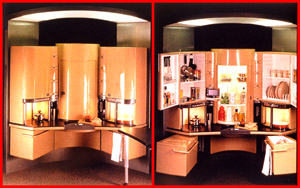SMITHSONIAN
EXHIBIT:
The Universal Kitchen Project
Excerpt
from Design Details for Health
By Cynthia A. Leibrock
The
Rhode Island School of Design has restructured kitchen standards
and developed prototype kitchens which adjust to meet the needs
of a full range of users. Time motion studies revealed that over
400 steps were needed to prepare a simple dinner in a standard kitchen;
these steps could be greatly reduced by design. Instead of an inter-related
work triangle, three separate major work areas were identified:
the food preparation area, the cleaning area, and the snack area.
The research also identified a comfort zone on the counter top the
zone is 16-in to 18-in deep.
|
Two
smaller refrigerators are placed is this zone, one in the
food preparation area and one in the snack area. This is one
example of the need for redundancy throughout the kitchen,
reducing the reach mobility, and time required for each task.
The research also identified a need for seating in the food
preparation area, communication problems, and environmental
concerns. One kitchen recycles grey water through a waste
channel. A continuous wet surface drains into this channel,
encouraging a clean-as-you-go work style.
|

|
 |
Three
kitchens were developed including a stand alone mini-kitchen
(left) which is perfect for dormitories, hotels, assisted
living, and independent living models. The cabinets unfold
to reveal a standard kitchen which contains everything needed
to make a moderately complex meal for two. Appliances components
are interchangeable with storage components, and the disappearing
doors on both do not sweep over the countertop.
|
Order
Design Details for Health (autographed) to benefit Rehabitat:
Cynthia@AgingBeautifully.org
|



